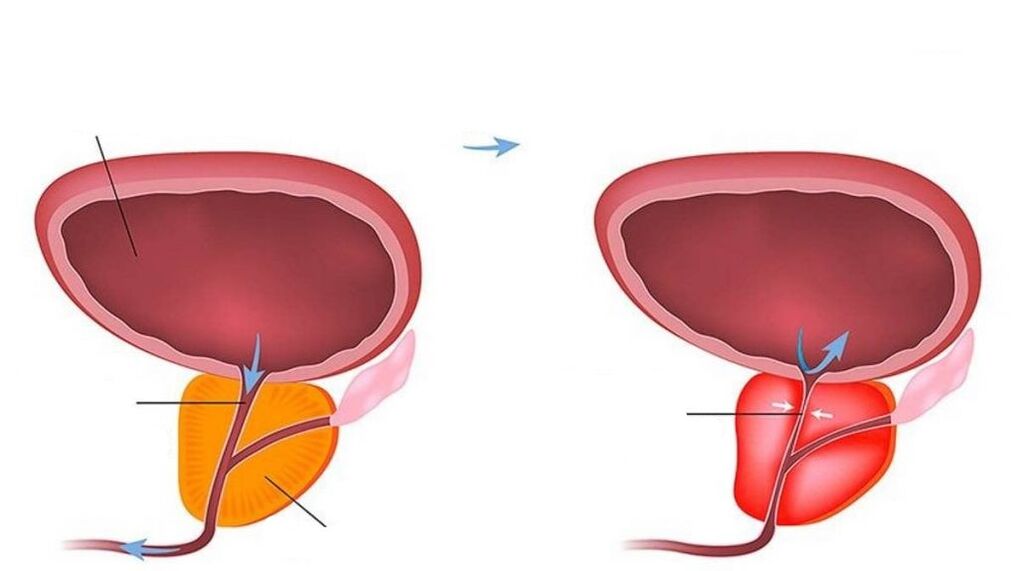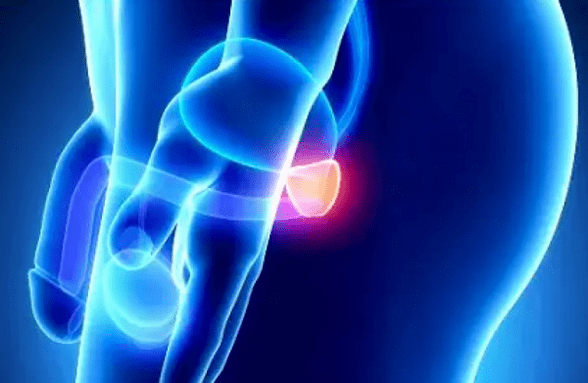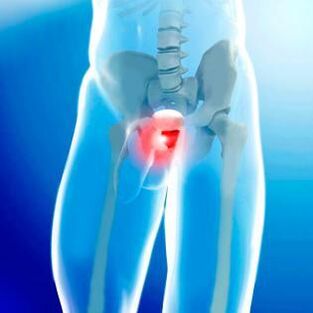Prostatitis is an inflammation of the prostate gland, also known as the prostate. This disease can occur for the following reasons:

- Infections.
- Bacteria.
- Viruses.
- Mushrooms.
- Long-term use of antibiotics, leading to a decrease in immunity.
In many cases, the infection enters the body through sexual contact. As a result, stagnation occurs in the pelvic organs and blood circulation is weakened.
There are also non-infectious causes of chronic prostatitis:
- Sedentary lifestyle.
- Improper structure of the prostate gland.
- Damage to the perineum.
- Congenital pathologies.
- Swelling of the prostate.
- Low testosterone.
- Hard physical work.
- Hypothermia.
- Stress and nervous tension.
The appearance of this pathology is also possible due to the development or insufficiently effective treatment of such diseases:
- Sinusitis.
- Stones in the kidneys.
- Angina.
- Inflammation of the urethra canal.
In addition, prostatitis can occur due to inconsistent sexual activity and regular interruption of action, which contributes to the development of stagnant processes.
Some facts to note:
- To maintain a healthy prostate, you should have sex at least twice a week.
- It is not necessary to delay urination (this not only contributes to the development of stagnation, but also negatively affects efficiency).
- Regular use of tobacco and alcohol damages the prostate, so do not abuse it.
How to determine if the prostate gland is inflamed?
Manifestations of prostatitis can vary significantly depending on the stage of development of the disease. There are 3 sections available:
- The discomfort appears in the lower abdomen. He often wants to empty his bladder (with a burning sensation).
- Problems start in the genital area (erection worsens, pain is felt during ejaculation, ejaculation occurs prematurely).
- In the last stage, the body temperature rises, there is pain when urinating, the patient shakes.
Important: in the case of chronic prostatitis, in this case, the development of the pathology is usually not accompanied by the appropriate symptoms (or the manifestations of the disease are poorly expressed). The danger of this form is that aggravation can begin at any time.

Treatment of chronic prostatitis with folk remedies
A number of conventional methods are used to treat prostatitis. We immediately say that each of the methods described below should only be used after prior consultation with your doctor. Keep in mind that self-healing can not only be ineffective but also exacerbate the problem.
In addition, you should understand that folk remedies do not allow for complete relief of chronic prostatitis. It makes sense for them to be used to prevent disease or as an aid, along with medications and physiological procedures prescribed by a doctor.
Garlic
Garlic is considered to be quite effective in preventing and treating chronic prostatitis. Recipe:
- Take a few cloves of garlic.
- Throw them in a container (such as a thermos) and pour a quarter liter of boiling water.
- Drink on an empty stomach before going to bed.
There is another recipe:
- Take three cloves.
- Pour 200 ml of cold milk.
- Bring to a boil over low heat and cook for a minute.
- Insist on half an hour.
- Take 35 drops four times a day after meals.
Onion peel decoction
Recipe:
- Peel the onion and rinse.
- Pour into a pan and pour half a liter of hot water.
- Bring to a boil for 5 minutes and leave for 60 minutes.
- Drink a teaspoon three times a day.
Combined intake of golden mustache balm and asparagus juice
To make the balm:
- Mix 150 ml of golden mustache alcoholic extract with 500 grams of flaxseed oil.
- Place in a closed container.
- Shake for 5-7 minutes.
This balm should be drunk three times a day for 10 days for a teaspoon, then for another 5 days, use 2-3 tablespoons of asparagus juice the same number of times. l. Repeat the cycle twice.
Warming of the prostate with the help of birch tar
3 tablespoons. l tar and pour 3 liters of boiling water. Then sit through this mixture for 7-10 minutes. The technique is effective in the early stages of prostatitis. Do not use in the presence of hemorrhoids or sexually transmitted diseases.

Tincture of poplar bark
We immediately say that bark collection should be done in early spring, when the leaves of the trees have not yet bloomed. This is very important as it is mostly saturated with juice during this period, which gives it a healing effect. Collect young bark up to 5 mm thick.
Recipe:
- Grind 100 g of dried bark.
- Fill with vodka until it completely covers the crust.
- Insist for 14 days and then filter.
- Consume 15-20 ml orally three times a day for one month.
Ivan tea tincture
Recipe:

- Grind the leaves of ivan tea and pour hot water in a ratio of 1 tablespoon. l. per bottle.
- Insist for 40 minutes.
- Clean the herb from the infusion and use one tablespoon daily.
Another recipe involves the use of not only leaves but also flowers. Pour out a glass of boiling water. The infusion is given overnight. It should be taken twice a day for half a glass.
Wine tincture with aloe honey
Aloe and honey are products that are widely used in traditional medicine. To make an anti-inflammatory drug, you will need:
- 0, 5 kg of aloe leaves (plants must be at least 3 years old).
- The same amount of honey.
- Half a liter of red wine (preferably dry).
You need to mix these ingredients and stick for 5 days in a dark and dry place. To prevent prostatitis, take 1 tablespoon 2-3 times a day. l. during the month. You will then need to take a 7-day break and repeat the course.
Creams and soda baths
Soda helps to cope with infections that occur during prostatitis. The bath and cream are made according to the same recipe. It is necessary to dilute the soda with 1 tablespoon of boiling water. l. per liter. Allow the solution to cool slightly before starting the procedure.
Propolis tincture
Made according to this recipe:
- The crushed propolis should be poured with pure alcohol in a ratio of 1-2.
- Place the medicine in a dark and non-hot place.
- Infusion for 14 days, shaking occasionally.
- Filter at the end.
This treatment should be taken on an empty stomach three times a day, mixed with warm milk. Proportions: 15 drops of tincture in 100 grams of milk.
Tincture of ginseng root and leaves
10 units of ginseng will require 1 unit of water diluted 1: 1. Insist for several days. Consume once a day. This prescription is not recommended if you suffer from insomnia or high blood pressure.
Alcoholic infusion on the roots of the aralia
Aralia has a number of beneficial properties that, among other things, have a positive effect on the condition of the prostate gland. But the problem is that this plant grows mainly in eastern countries (Mongolia, China, Korea). At our latitudes, it is quite difficult to obtain the roots of aralia.
If you succeed, here is a recipe for making the tincture:
- Pour 20 g of root with 70% alcohol in 100 ml (vodka will also work).
- Insist for several days.
- Drink 10 drops three times a day.
The drug is not only effective in prostatitis. It also provides an opportunity to treat sexual dysfunction. However, in the presence of cardiovascular disease, this infusion should not be used.
Dill infusion in port wine
Mix 100 g of medicinal dill with 1 liter of powder. The medicine should be prepared within 3 weeks. Eat half a glass before a meal. The tincture reduces inflammation of the prostate gland.
A mixture of nuts and honey
For a long time, nuts were used to restore male strength. To make a medicine for prostatitis:
- Cut 5 nuts.
- Add half a glass of honey.
- Stir thoroughly.
Eat 1 tbsp at the beginning of the day. l.
Chamomile tea and bath
To make chamomile tea you need to pour 200 ml of boiled water 1 tbsp. l. dried plant and stick to it for several hours. Take it three times a day on an empty stomach. The drug allows you to cope with the infection and relieve inflammation.
The chamomile infusion bath is prepared as follows:
- 5 tablespoons. l. Pour dried chamomile with hot water.
- Bring to the boil for a few minutes and cook for about 2 hours.
- When bathing, add to the bath.
Chestnut shell tea
Remove the peel from the chestnut fruit. Fill with hot water, boil for a few minutes and use in it. The drink doesn’t taste very pleasant, so you can add a little honey.
Bathroom with pine needles
You need to boil the branches of a coniferous tree (ideally pine) and pour it into the bathroom. The water temperature must not exceed 38 ° C. Ingredients can be collected independently or purchased at the pharmacy.
Pumpkin seeds
The last folk remedy for inflammation on the list is pumpkin seed. It should be consumed in 30 pieces per day. It helps both to prevent the development of pathology and to reduce the pain of symptoms.
Can inflammation of the prostate go away on its own?
Don’t even expect the prostatitis to go away on its own. This is not possible even for the first stage. If appropriate measures are not taken, the disease will only progress and, as a result, develop into a chronic.
Contact your urologist immediately if you have symptoms. Prescribe the necessary medications. Treatment of prostatitis usually includes physical education and proper nutrition. In some cases, immunomodulators and antidepressants are prescribed.
What is the risk of prostatitis and how does it manifest itself?
Determining the presence of inflammatory processes in the prostate is fairly straightforward. Prostatitis does not pose a serious threat to human life. However, without qualified medical care, the pathology can cause serious discomfort, limiting life.
If the prostate is inflamed, it leads to discomfort in the perineum and lower back. The disease is often accompanied by pain. It can be sore and sharp. Pain is especially important for men who do not have constant sexual intercourse.
If there are infections, mucus or pus may appear in the secretions. Failure to start treatment on time will ultimately lead to a deterioration in sperm quality.
Is it possible to completely cure chronic prostatitis?
Statistics on the treatment of prostatitis show that relapses are quite common. In many cases, the recurrence of the disease is due to the fact that patients do not have enough stamina to get rid of the pathology completely.
Of course, treating prostatitis requires a lot of patience and significant financial costs. So, for example, if you have an infection and your doctor has prescribed antibiotics, you should by no means stop them halfway, even if the disease no longer makes you feel better. If you do not stop taking the medication, the pathogens will recover over time and you will also become immune to the medications you are taking.
Thus, although relapses often occur in chronic prostatitis, the patient's condition is primarily self-limiting. If you strictly follow your doctor’s recommendations, the signs of inflammation will not be felt for a long time and may even disappear forever.
Tests for prostatitis
In all cases where prostatitis is suspected, the following procedures are prescribed:
- Blood Test - allows you to identify inflammation by testing leukocyte levels and erythrocyte sedimentation rate (ESR).
- Urine analysis - performed several times. It allows the detection of increased levels of bacteria and white blood cells.
- Examination of prostate secretion - allows early detection of prostatitis, prostate cancer and infertility.
- Urine culture - allows you to determine the susceptibility of bacteria that cause prostatitis, thereby selecting the right antibiotics.
In case of chronic prostatitis, 4 bottles of urine are taken. This test allows you to understand exactly where the infection is located. The analysis is performed as follows:
- The patient fills tube 1 with urine.
- After that, urination continues in 2nd place.
- The doctor massages the prostate. The outstanding secret counts as Test 3.
- Urine residues leaving after the massage are the 4th sample.
Additional laboratory tests are performed:
- If bacteria are found in Part 3 or 4, it means that the prostatitis is bacterial.
- If more than 10 leukocytes are present in the same samples, there is inflammation of the prostate gland.
- If there are more than 10 leukocytes but the bacterial flora is normal, this may indicate the presence of chlamydia and other infections.
In the latter case, the urethra and mucosa are scraped, allowing the detection of sexually transmitted microorganisms.
In some cases, digital rectal examination raises suspicions of adenoma and prostate cancer. This situation is the cause of the diagnosis in which a blood test is performed to measure the level of PSA (prostate-specific agent).
Note: PSA sampling should be performed at the earliest 10 days after rectal examination.
What tests are done to diagnose prostatitis
Antibiotics can be treated with antibiotics, antibacterial drugs (non-steroids), and drugs that increase immunity and improve blood supply. However, without prior diagnosis, it is impossible to prescribe the most effective drug therapy that allows the form of the disease to be understood.
Traditionally, an ultrasound (ultrasound) is performed when acute prostatitis is suspected. With this method, the doctor:
- Determine the volume and density of the prostate.
- Find out if the venous plexus of the prostate is enlarged.
- Look for signs of abscess.
Endoscopy is prescribed in some cases, but this method is contraindicated in acute prostatitis.
If prostatitis is accompanied by a neurogenic urinary disorder, the following procedures may be prescribed:
- Introduction of catheter probes to determine and record the urethral pressure profile.
- Myography, which allows the work of the pelvic floor muscles to be assessed.
- CT and MRI if there are prerequisites for prostate cancer or non-inflammatory prostatitis.
Conservative treatment can prescribe laser therapy, herbal medications, magnetotherapy, electrophoresis, mud baths, and many other procedures. If this approach is ineffective, surgery is needed.
Types of ultrasound for different forms of prostatitis
According to statistics, in about 80% of chronic prostatitis, disease-causing particles cannot be detected by laboratory tests. However, palpation does not always allow us to calculate the correct diagnosis, as obvious structural changes do not always occur in the prostate.
Even in the case of chronic infectious prostatitis, bacteriological analysis sometimes proves to be of little information. The diagnostic error is usually due to the fact that the microbes accumulate in the tissues but do not get into the secretions taken up in the laboratory.
In this regard, ultrasound is almost always prescribed along with analyzes. This procedure allows not only the identification of prostate lesions, but also the dynamic monitoring of improvements during treatment.
Two types of ultrasound are used in modern diagnostics:
- Transrectalis.
- Transabdominal.
Each of these techniques has unique advantages and disadvantages.
Transrectal method
In this case, an ultrasound device is placed in the patient's rectum. The method provides excellent visualization and allows the collection of the most complete information about the condition of the prostate gland.
Contraindications:
- Hemorrhoids and anal fissures.
- Postoperative rehabilitation period.
- Benign and malignant tumors.
Transabdominal method
The prostate is examined through the anterior abdominal wall. The method makes it possible to determine the size and boundaries of the gland and the symmetry of its lobes. The disadvantage of such ultrasound is that not all hospitals use equipment whose quality allows reliable information on the condition of the tissues to be obtained.
What are the consequences of not treating prostatitis?
If left untreated, prostatitis can cause the following complications:
- An abscess in the prostate gland that requires immediate hospitalization and surgery.
- The formation of cysts and stones in the prostate, causing severe pain and requiring long-term treatment.
- Vesiculitis (inflammation of the gallbladder) that is only treated in a hospital setting.
- Sclerosis of the prostate, which causes urination problems.
- Infertility.
What is the purpose of prostate massage?
Prostate massage is a procedure that is performed in all cases of chronic prostatitis, except for calcular prostatitis. They are also appointed in such situations:
- In the absence of orgasm.
- In case of impotence.
- For diagnostic purposes (allows detection of inflammatory processes).
Many men have certain prejudices about prostate massage, subconsciously identified with homosexuality. In fact, this procedure makes it possible to prevent the development of prostatitis, remove infected secretions, prevent the development of stagnant processes, improve blood circulation and increase male strength, improve the quality of intercourse.
However, there are situations when prostate massage cannot be performed:
- Severe inflammation of the prostate gland.
- Tumor (both benign and malignant).
- Infections of the urogenital system.
- Hemorrhoids and anal fissures.
- Calculative form of prostatitis.
- Prostate tuberculosis.
- Violation of urination.
- Exacerbation of chronic prostatitis.
Does chronic prostatitis interfere with normal sex and conception?
Chronic prostatitis usually has no sexual problems. But it also happens in other ways. It is quite understandable that inflammation of the prostate gland causes discomfort (not only physical but also psychological). Painful feelings make it difficult for a man to enter into intimacy with his partner. However, psychological factors can lead to erectile problems.
The infectious form of chronic prostatitis should be mentioned separately. In this situation, there is a risk of bacteria or fungi being transmitted to the partner during sexual intercourse.
Tip: If you decide to have a baby, be sure to examine yourself and check for an infection. And if they find you, take a cure.
Why is regular sex life important with prostatitis?
It is important for the normal functioning of the body that we meet all its needs. The condition of the prostate gland has a significant effect not only on sexual activity but also on the ability to conceive. This is due to the fact that the secretion produced in the prostate is the part of the sperm that is responsible for the vitality and activity of the sperm.
When the prostate becomes inflamed, the metabolic processes in the cells of the gland are accelerated, resulting in the release of toxins that accumulate in the secretions. As a result, during orgasm, these harmful substances leave the body along with the sperm, contributing to the normalization of the prostate and faster healing.
There is another important point: with prostatitis, inflammatory processes occur that cause blood flow to deteriorate. With sexual arousal, the blood supply to the penis increases significantly, and the pelvic floor muscles contract during ejaculation. All this has a positive effect on the condition of the gland and helps to cope with prostatitis.
How likely is infertility in chronic prostatitis?
In the initial stage, prostatitis is not a barrier to conceiving a child. In some cases, there are erectile problems caused by physiological and psychological factors. But with proper handling and understanding of the partner, the problem can be solved.
It is a completely different matter to ignore the presence of prostatitis for a long time. The development of the pathology can lead to a decrease in the quality of the sperm: the sperm will not be active enough and will not be able to reach the point where conception occurs. Moreover, this problem cannot always be detected by the results of the analyzes.
If you have inflammation of the prostate and cannot have a child, see your doctor. In addition to treatments to eliminate inflammatory and infectious processes in the prostate gland, diet and vitamins are usually prescribed. Although they do not increase the likelihood of conception, they strengthen the immune system, which helps prevent the development of new infections.
What to do if a child cannot get pregnant for a long time?
Doctors say that in a normal situation, conception should take place within a year of regular and unprotected intercourse. Otherwise, you should consult a doctor for a comprehensive examination.
It is recommended that a man perform the following procedures:
- Spermogram - allows you to determine the number of active sperm and assess the chemical and physical composition of the sperm.
- Genital ultrasound - aims to study the structures responsible for the formation and excretion of sperm and to identify problems with the blood supply.
A wider range of procedures are provided for women:
- Evaluation of basal temperature over 3 menstrual cycles followed by scheduling.
- Genital ultrasound.
- Hysterosalpinography - an image of the uterus and fallopian tubes to assess their anatomical structure and permeability.
- Hysterosonography is an ultrasound examination of the uterine cavity.
- Blood test to determine hormonal parameters of the endocrine system.
In some cases, conception problems arise due to conflicts of interest between the spouses. A postcoital test is prescribed and a genetic test is performed to determine the presence of the problem.



























